Henry Hu is a fit man. He strides up the last 10 steps of the mountain trail, wipes the light sheen of perspiration from his brow, and greets the small congregation of elderly men and women already ensconced on the peak.
Henry is 67 years old. I am about half his age, but as I clamber up after him, dripping with sweat, heart pounding, breathing labored, I feel the burden of my fewer years more heavily and regret the many mornings I've idled in bed when I could've been out on the trail in Sungshan Nature Reserve.
Some small degree of daily discipline could see me romping up this peak at the age of 87 -- like "Uncle Chang", currently the oldest man to tread the many steps to its summit. Failing that, I could strive for 83-and-still-going-strong -- which is exactly what the oldest woman traipsing around this hilly patch of Taipei County is doing.
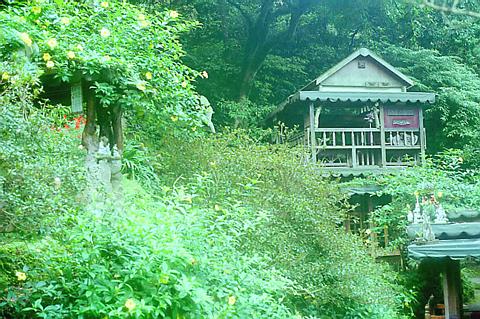
PHOTO: ANDREW PERRIN, TAIPEI TIMES
Lofty ambitions aside, even the remarkable Uncle Chang cannot yet lay claim to being the oldest person ever to climb Nine-Five Peak -- at a modest 375 meters, the highest mountain in the reserve.
That honor purportedly belongs to Yu Hui, a general in Chiang Kai-shek's Nationalist army, who was a sprightly 95 years old when he climbed to the summit on the fifth day of the ninth month in 1915. This feat, immortalized in the mountain's name, has set a benchmark for Taipei's "long-life" walkers. Setting new standards, however, is not what most people have in mind when they visit the nature reserve and its well known Four Animals Mountains -- namely the Elephant, Lion, Leopard and Tiger mountains. (The Taipei World Trade Center offers a good vantage point for discerning these supposedly animal-shaped peaks. The terminally keen should arm themselves with a map of the reserve and a vivid imagination.)
"I come for the fresh air and the breezes," says Henry, who lives in the Hsinyi district and has been taking his early morning constitutionals in the reserve for the past 10 years. "I walk for two hours every morning, it keeps me fit, and it's close to home.
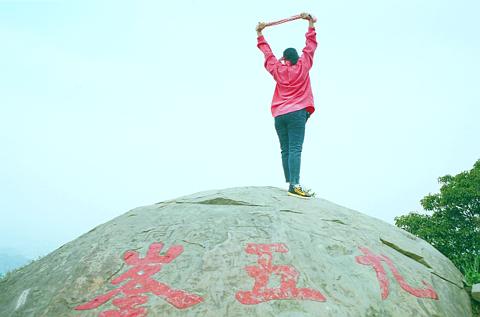
PHOTO: ANDREW PERRIN, TAIPEI TIMES
"And the views," adds Linker Lin, another regular. "Nine-Five Peak offers the best view of Taipei City. There's no other place like this."
And therein lies the core appeal of this large park on the city's eastern edge: a combination of fresh air, densely forested ridges and peaks threaded with a network of walking trails, all the free exercise you could ask for, bird's-eye views of the sprawling metropolis and, above all, proximity.
The reserve's many entry points are but a short trip by bus, scooter or car from the city center, and in the eyes of many of its regular visitors, it's this ease of access that gives Sungshan the edge on the much-lauded Yangmingshan National Park.
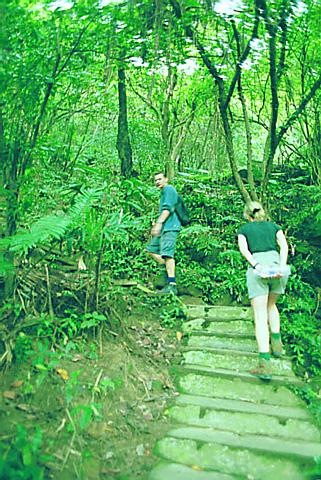
PHOTO: ANDREW PERRIN, TAIPEI TIMES
The semi-retired Warker Chen, a devotee of Sungshan's walking paths for the past six years, is critical of Taipei's prize park.
"You need time and transportation to get to Yangmingshan," is his assessment, "and it's a little artificial -- lots of private houses have been built there. Here in Sungshan, there are just small huts for resting and refreshment, and the scenery is more natural."
The rustic huts to which he refers, built by a particularly hardy breed of volunteer laborer (everything used in their construction and maintenance has to be lugged from downtown), punctuate the reserve's trails at regular intervals. Temporary harbors for the tide of human traffic that washes through the reserve during peak visitation times -- early mornings, weekends and public holidays -- they provide venues for eating, drinking, resting, socializing and the ubiquitous karaoke session, when the hills do Julie Andrews proud and come alive with the sound of music.
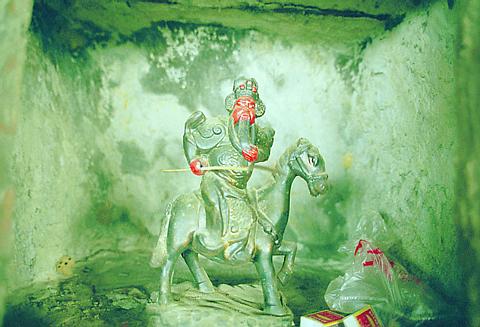
PHOTO: ANDREW PERRIN, TAIPEI TIMES
Those with a bent for exploration should, at some point, abandon the reserve's main thoroughfare -- the paved walkways -- and head up or down one of the dirt offshoots. One caveat: after rain the mossy rocks lining these tracks can become super-slick. It doesn't really matter which route you choose -- signage is abundant so you're unlikely to get lost, and if you can't read Chinese, just follow someone who looks as if they know where they're going.
For the more intrepid, the four ropes snaking down from the lip of the ridge north of Nine-Five Peak provide an alternative that Warker Chen describes as "a little bit dangerous, but very exciting."
Heading for the high ground is obligatory. Elephant Mountain, which rises to a mere 180 m, offers a gentle introduction to the art of step climbing, culminating in a fine view of the city.
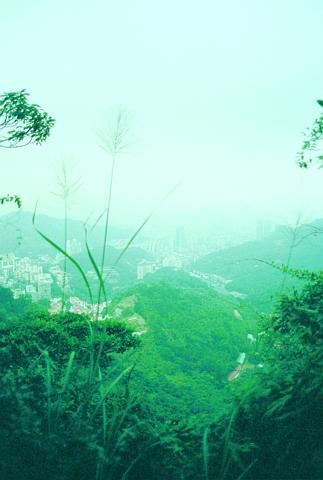
PHOTO: ANDREW PERRIN, TAIPEI TIMES
Of course, the quality of the views from any of the reserve's many peaks is variable, depending on the density of cloud cover and the amount of smog filling the city basin.
On sunny days, the city presents its unrestrained sprawl for uncommonly clear scrutiny; more usually, cloud and smog muffle the vista. The duller days are not lacking in beauty, however: late-afternoon shards of light sometimes pierce the mist, gilding the waters of the Tamshui and Keelung rivers.
After attaining the summit of Nine-Five Peak, there's neighboring Nankang -- offering more of the same view -- and then there's The Thumb. An outcrop of rock rising from a forested ridge about a half-hour's walk south of Nine-Five, The Thumb may be a lesser elevation, but it's still worth the short scramble to its apex. Scarred with graffiti and tipped with tiled stone seats, it makes a splendid, if sometimes crowded, eyrie.
More than a place of leafy charm, the reserve seems to inspire a spontaneous camaraderie among its visitors. This manifests itself in chorused greetings from crocodiles of puffing trekkers, wayside chats and, if you're lucky, the odd impromptu performance -- like that delivered by the most uncommon Professor Yi.
Now aged 72, the professor has tended the Yellow Cicada Garden, in the Tiger Mountain section of the reserve, for the past 22 years, often putting in 10-hour days as he carries out maintenance work on the terraced gardens, carp ponds and shelters built from recycled materials.
His efforts are hugely appreciated by all who visit, from the people who come for the karaoke to those who come for the occasional silence, the rest, and to forget about everything downtown. The work is clearly a labor of love -- and a panacea for social ills. "Many people get into the gambling scene when they retire. This work is good for your health and saves money!" he says, roaring with laughter.
After spending some minutes chatting to the professor about the new drainage system he's installing, it's clear to me that here is a man of great community spirit and practical skills. What I don't realize, until a passer-by utters the magic word, karaoke, is that the professor is in good voice -- right now. Like a maestro giving a command performance, he makes a stage of the step he is standing on, takes a deep breath and launches into unabashed song. For a moment, even the chirping katydids and crickets are outdone and fall silent.
Hangout for retirees, outdoor venue for karaoke enthusiasts, free exercise center for fitness fanatics, trysting place for lovers, safe harbor for native plants and animals -- Sungshan Nature Reserve is that rare and special thing: an oasis in an urban jungle, a place for all people.

The CIA has a message for Chinese government officials worried about their place in Chinese President Xi Jinping’s (習近平) government: Come work with us. The agency released two Mandarin-language videos on social media on Thursday inviting disgruntled officials to contact the CIA. The recruitment videos posted on YouTube and X racked up more than 5 million views combined in their first day. The outreach comes as CIA Director John Ratcliffe has vowed to boost the agency’s use of intelligence from human sources and its focus on China, which has recently targeted US officials with its own espionage operations. The videos are “aimed at

STEADFAST FRIEND: The bills encourage increased Taiwan-US engagement and address China’s distortion of UN Resolution 2758 to isolate Taiwan internationally The Presidential Office yesterday thanked the US House of Representatives for unanimously passing two Taiwan-related bills highlighting its solid support for Taiwan’s democracy and global participation, and for deepening bilateral relations. One of the bills, the Taiwan Assurance Implementation Act, requires the US Department of State to periodically review its guidelines for engagement with Taiwan, and report to the US Congress on the guidelines and plans to lift self-imposed limitations on US-Taiwan engagement. The other bill is the Taiwan International Solidarity Act, which clarifies that UN Resolution 2758 does not address the issue of the representation of Taiwan or its people in

DEFENDING DEMOCRACY: Taiwan shares the same values as those that fought in WWII, and nations must unite to halt the expansion of a new authoritarian bloc, Lai said The government yesterday held a commemoration ceremony for Victory in Europe (V-E) Day, joining the rest of the world for the first time to mark the anniversary of the end of World War II in Europe. Taiwan honoring V-E Day signifies “our growing connections with the international community,” President William Lai (賴清德) said at a reception in Taipei on the 80th anniversary of V-E Day. One of the major lessons of World War II is that “authoritarianism and aggression lead only to slaughter, tragedy and greater inequality,” Lai said. Even more importantly, the war also taught people that “those who cherish peace cannot

US Indo-Pacific Commander Admiral Samuel Paparo on Friday expressed concern over the rate at which China is diversifying its military exercises, the Financial Times (FT) reported on Saturday. “The rates of change on the depth and breadth of their exercises is the one non-linear effect that I’ve seen in the last year that wakes me up at night or keeps me up at night,” Paparo was quoted by FT as saying while attending the annual Sedona Forum at the McCain Institute in Arizona. Paparo also expressed concern over the speed with which China was expanding its military. While the US